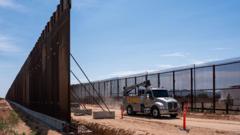Canada is set to drop some of its retaliatory tariffs on US imports, with Prime Minister Mark Carney emphasizing the benefits of re-establishing free trade under the USMCA. Although levies on critical sectors like autos and steel remain, this decision marks a pivotal step towards improved trade relations following a recent discussion with President Trump.
Canada Eases Trade Tensions with US by Dropping Retaliatory Tariffs

Canada Eases Trade Tensions with US by Dropping Retaliatory Tariffs
In a significant move, Canada’s Prime Minister Mark Carney announces the reduction of certain retaliatory tariffs on US goods, signaling a possible thaw in trade relations.
Canada has announced a reduction in retaliatory tariffs imposed on US goods, a development that could ease trade tensions between the two nations. Prime Minister Mark Carney revealed this decision on Friday after a telephone conversation with President Donald Trump, the first since both countries missed a self-imposed trade agreement deadline.
Canada had rolled out a 25% tariff on approximately C$30 billion ($21.7 billion) worth of American products, including items like washing machines and orange juice, in response to US tariffs averaging 35% on goods not compliant with existing trade agreements. Effective September 1, Canada intends to lift tariffs on goods that conform with the US-Mexico-Canada Agreement (USMCA), aiming to restore nearly unfettered trade on the majority of these goods, Carney stated.
The White House welcomed Canada's move, deeming it long overdue, as trade discussions between the two countries progress. Trump expressed intentions to discuss trade with Carney again soon.
Despite the welcomed move, criticisms arose from Conservative leader Pierre Poilievre, who accused Carney of abandoning a tough negotiating stance, claiming the prime minister's resolve has diminished. Carney defended his actions by emphasizing that Canada maintains a relatively low tariff rate at around 5.6%, compared to the higher average tariffs imposed on other countries.
As part of his broader global trade strategy since returning to office, Trump has leveraged tariffs as a negotiating tool, and the US has imposed tariffs on imports of steel and aluminum while also maintaining barriers on automotive imports. Economic analysts have voiced concerns over US tariffs creating disruptions in Canadian industries that extensively rely on cross-border trade.
The focus will now shift to negotiations surrounding sensitive areas such as autos, steel, aluminum, and lumber, ahead of the forthcoming review of the USMCA slated for next year. As Canada prepares to navigate these complex trade landscapes, the coming months will be crucial in determining the future of bilateral trade relations.




















